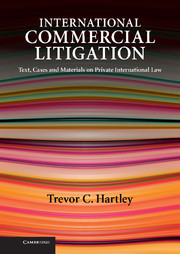Book contents
- Frontmatter
- Contents
- Table of panels
- List of figures
- Preface
- Acknowledgments
- Terminology
- Table of Latin phrases
- List of abbreviations
- Table of cases
- Table of cases (European Court of Justice, numerical order)
- Table of legislative instruments
- PART I STARTING OFF
- PART II JURISDICTION
- PART III FOREIGN JUDGMENTS
- PART IV PROCEDURE
- PART V CHOICE OF LAW
- PART VI EXTRATERRITORIALITY
- 32 Introduction to Extraterritoriality
- 33 Extraterritorial application of US antitrust law
- 34 The international response
- 35 Extraterritorial application of EC competition law
- Bibliography
- Index
35 - Extraterritorial application of EC competition law
from PART VI - EXTRATERRITORIALITY
- Frontmatter
- Contents
- Table of panels
- List of figures
- Preface
- Acknowledgments
- Terminology
- Table of Latin phrases
- List of abbreviations
- Table of cases
- Table of cases (European Court of Justice, numerical order)
- Table of legislative instruments
- PART I STARTING OFF
- PART II JURISDICTION
- PART III FOREIGN JUDGMENTS
- PART IV PROCEDURE
- PART V CHOICE OF LAW
- PART VI EXTRATERRITORIALITY
- 32 Introduction to Extraterritoriality
- 33 Extraterritorial application of US antitrust law
- 34 The international response
- 35 Extraterritorial application of EC competition law
- Bibliography
- Index
Summary
Introduction
Though invented in the United States, antitrust law (called ‘competition law’ in Europe) has come to be accepted in Europe as an essential component of a free market. For this reason, the EC Treaty has contained provisions on competition law right from the start. Originally, the basic provisions were Articles 85 and 86 in the EC Treaty; today they have been renumbered Articles 81 and 82. They are set out in Panel 35.1. It will be seen that these provisions prohibit agreements, etc. which ‘may affect trade between Member States’ and which have as their ‘object or effect’ the restriction of competition within the Common Market.
Panel 35.1 EC rules on competition EC Treaty, Articles 81 and 82
Article 81
1. The following shall be prohibited as incompatible with the common market: all agreements between undertakings, decisions by associations of undertakings and concerted practices which may affect trade between Member States and which have as their object or effect the prevention, restriction or distortion of competition within the common market, and in particular those which:
(a) directly or indirectly fix purchase or selling prices or any other trading conditions;
(b) limit or control production, markets, technical development, or investment;
(c) share markets or sources of supply;
(d) apply dissimilar conditions to equivalent transactions with other trading parties, thereby placing them at a competitive disadvantage;
(e) make the conclusion of contracts subject to acceptance by the other parties of supplementary obligations which, by their nature or according to commercial usage, have no connection with the subject of such contracts. […]
- Type
- Chapter
- Information
- International Commercial LitigationText, Cases and Materials on Private International Law, pp. 853 - 861Publisher: Cambridge University PressPrint publication year: 2009



